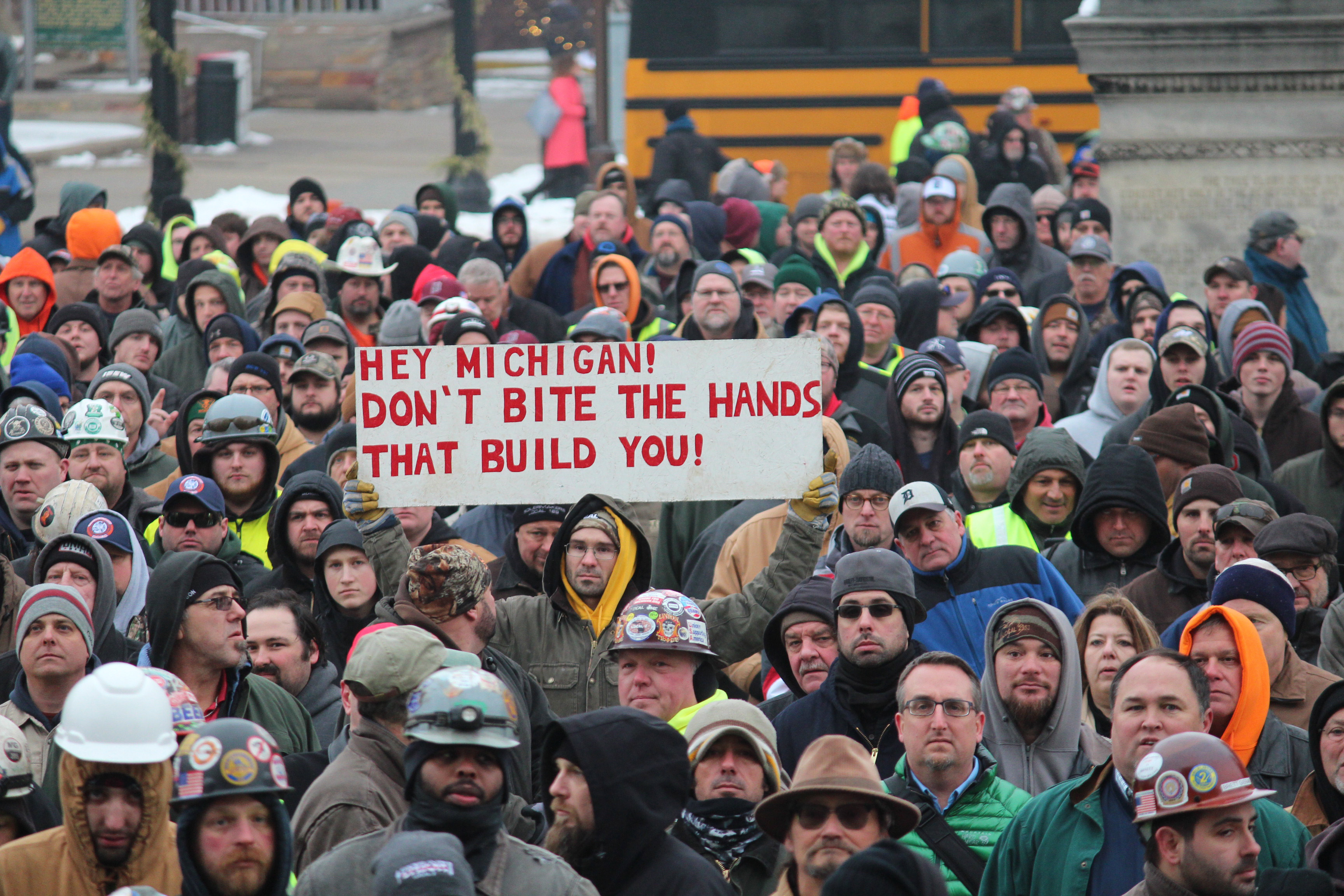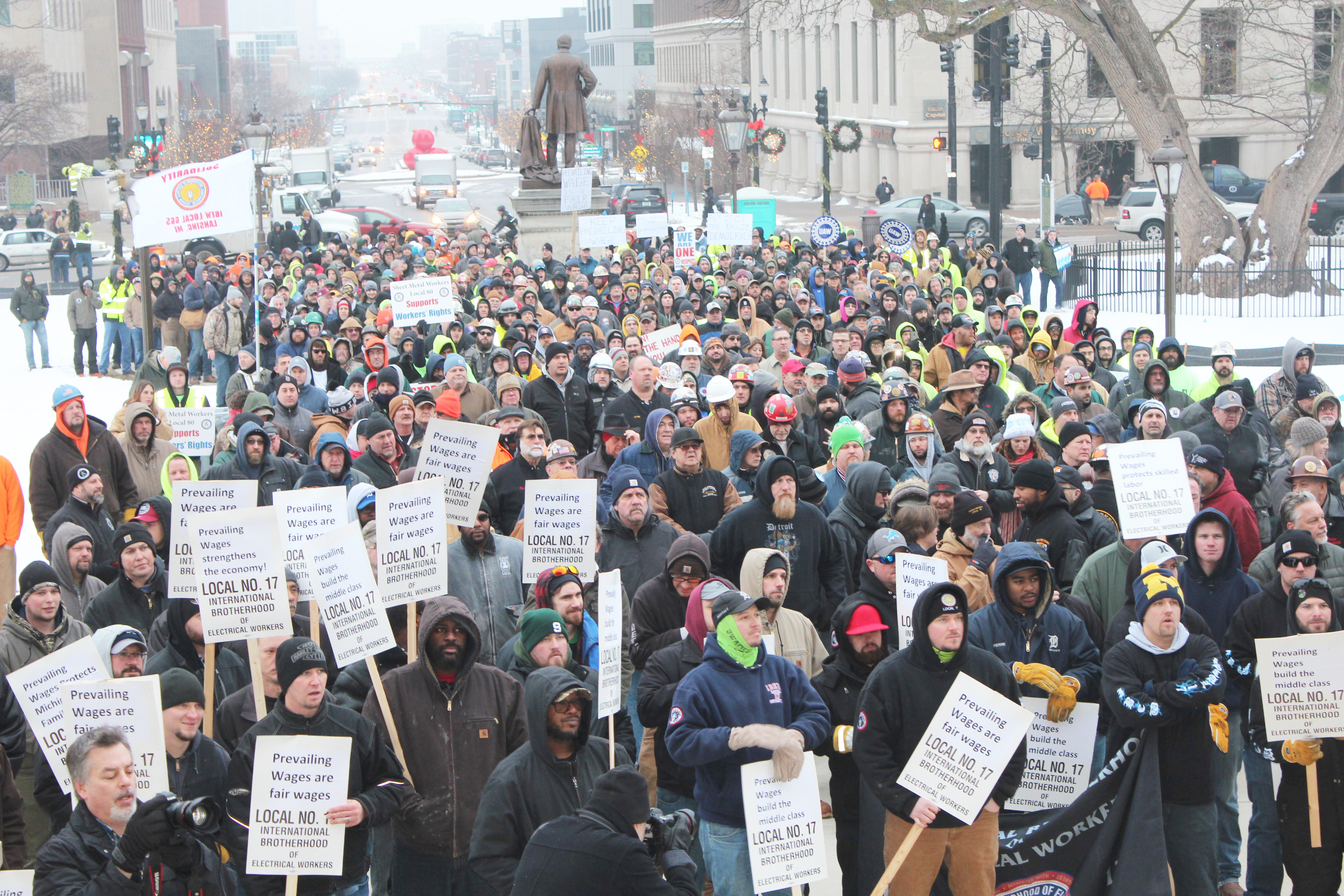Prevailing wage rally energizes hundreds to sustain vital law
Date Posted: January 26 2018

The rally was a response to the completion of a petition drive by the Associated Builders and Contractors- Michigan and their front group, Protecting Michigan Taxpayers, seeking to repeal the law. They submitted 379,903 petition signatures to the state Bureau of Elections late last year, although they only need 252,523 valid signatures.
However, a review of a sampling of 535 of those signatures by lawyers for the Michigan Building and Construction Trades Council revealed that 43 percent of those signatures should be found to be invalid due to reasons like duplication or the signer being an unregistered voter. If that 43 percent invalid rate continues with a greater sampling, then it's enough to invalidate the petition drive.
Michigan Building and Construction Trades Council Secretary Treasurer Patrick Devlin told the crowd that the ABC was expecting that morning to be celebrating a successful petition drive. "That isn't happening, and that's a major victory for us," Devlin said. "Based on what we did last time (in 2015) we might still have a chance of beating this thing back and not having it certified at all." In the failed effort cited by Devlin, the ABC/Protecting Michigan Taxpayers failed to collect enough prevailing wage repeal signatures in 2015 because of thousands of multiple invalid signatures.
The Michigan Bureau of Elections announced this month that based on the high invalidation rate found in examining the first 535 signatures, they would examine a greater sampling of 4,000 names from the petitions, allowing the state to make a determination of whether to certify the entire petition based on those findings.
Michigan Building and Construction Trades Council attorney John Pirich's team found that only 303 of the 535 signatures should be approved - a 43.4 percent validation rate. If that number were extrapolated, it would equal 215,025 signatures - far short of the 252,523 signatures that are needed according to state law.
However, according to a spokesman for the Michigan Bureau of Elections, their analysis of the same 535 sample signatures found 370 of the names were valid - a 69.1 percent validation rate. If that number were extrapolated, it would equal 262,512 signatures - a thin margin to approve the petition by about 10,000 signatures.
Bureau of Elections spokesman Fred Woodhams said that the state's count placed the entire petition effort into a "gray area" under a formula the state "has used for decades," triggering the greater sampling of names. He said the discrepancy between the building trades' finding of 303 valid petition signatures vs. the state's finding of 370 valid signatures was a simple case of disagreement.
On Jan. 16, Woodhams said that the examination of the greater sampling of signatures had begun and copies of the signature sheets they are looking at would be shared with challengers. He said the process would likely take "a number of weeks." The findings will then be forwarded to the state Board of Canvassers, a four-member panel with two Democrats and two Republicans, who have the authority to void the petition drive or sustain it by forwarding the petition question to the Michigan Legislature.
That's where lobbying comes into play.
"We are here to fight together, to protect your right to a prevailing wage," said Michigan Building and Construction Trades Council President Steve Claywell to the ralliers. "This is your Legislature, and it's up to us to convince our lawmakers to protect prevailing wage."
The state Senate is considered a lost cause for lobbying, with only 11 of the 38 members being Democrats - all of whom support prevailing wage - and only a handful of Republican senators supporting prevailing wage.
The count is closer in the 110-member state House, where the GOP also enjoys a solid majority, and about 10 Republicans would need to be convinced to join the solid Democratic caucus supporting prevailing wage. That was part of the rally effort - attendees were asked to visit their lawmaker's office afterward and urge them to not to repeal the state's prevailing wage law.
If a majority of lawmakers in either the House or Senate don't vote to repeal the law, as the ABC/PMT petition asks, the repeal question would then go to a vote of the people on Nov. 6. Statewide polling has indicated a substantial amount of support for retaining prevailing wage.
"I'm sorry that you have to be here," said House Democratic Leader Sam Singh (D-East Lansing) to the rally participants. "But this is what has been happening this past year. First they came for the teacher pensions, they tried to close down the pension system, we were able to stop that. It wasn't the best deal, but we were able to stop that.
"Then they came after police and firefighter pensions, and their health care. We stopped that. Now they're coming after prevailing wage. And I can tell you right now that I am one of 46 members out of 110 members in the Democratic caucus, every single one of us have said they will oppose the repeal of prevailing wage. Your job today is to get 10 additional votes so that we can take it to the voters in November. You need to talk to every one of those Republicans and tell them what you do for a living, what you do for your schools, what you do for your roads, what you do for the state of Michigan."

SEVERAL HUNDRED tradespeople and supporters gathered in front of the steps of the Michigan Capitol Building on a frigid Jan. 10 morning to express their support for the state’s Prevailing Wage Act. The rally was followed up by visits to the offices of individual state lawmakers, urging them to “let the people decide” - in other words, allow the repeal question to go to the ballot in November, as opposed to leaving the matter to a vote of the state Legislature.

A SIGN AT THE “Let the voters decide’ rally in Lansing on Jan. 10.
